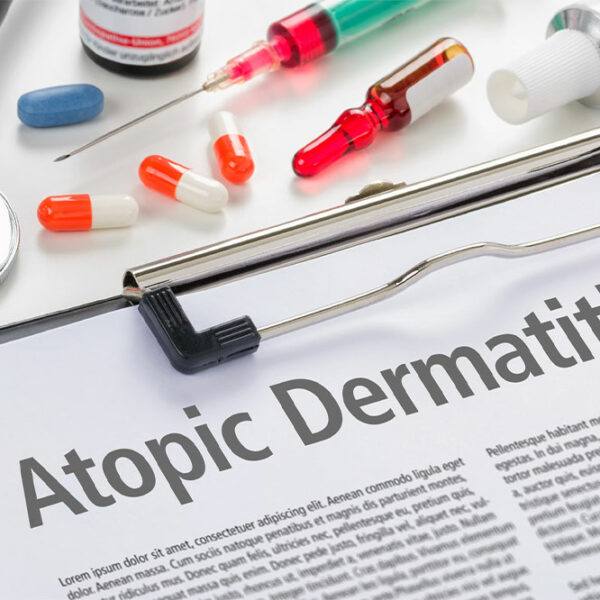Measures to Manage and Prevent Atopic Dermatitis
If a person’s skin turns red and itchy, it could be a sign of atopic dermatitis, also known as eczema. While the condition is common in children, it can affect people of all ages. Over 31 million people in the country are affected by some form of eczema. This skin condition is chronic and can flare up several times throughout the year. Sadly, there is no permanent cure, but there are ways to manage it.

Atopic dermatitis treatment options
The symptoms caused by eczema can take years to subside, even with treatments. And the flare-ups of the condition may resurface even after a treatment plan works successfully. Keeping this in mind, here are ways to treat atopic dermatitis treatments:
Creams
Doctors often recommend some of the best corticosteroid creams or ointments to curb the itching to heal the skin. Other prescription creams containing calcineurin inhibitors are prescribed for people above the age of two to curb skin reactions. Additionally, antibiotic creams might be recommended if the skin has a bacterial infection, cracks, or open sores. Most creams must be applied to the skin after moisturizing or however prescribed by the doctor. It is important to be aware of the side effects, like thinning of the skin that may stem from using such creams.
Oral prescriptions
Besides creams, oral treatments are also prescribed by doctors to manage eczema. Oral antibiotics are given to those with Staph infections, where there is oozing of fluids from the skin. Antihistamines help relieve symptoms like allergies and hives in people affected by the condition. Oral corticosteroids are also prescribed for severe cases of eczema, but these are only recommended for a short term, as excessive use may result in serious side effects.
Injectable biologics
The FDA has recently approved injectable biologics for people with a severe form of the disease. The option is recommended only when other treatments do not work. The price of such injectables is on the steeper side. However, they are effective and have proved to be safe when used as directed.
Light therapy
Doctors suggest light therapy to people who don’t respond well to topical treatment or suffer from flare-ups after treatment. A general method of light therapy is phototherapy. Here, the affected skin is exposed to controlled amounts of natural sunlight. Another form is artificial ultraviolet A (UVA) and narrow band ultraviolet B (UVB). These therapies are prescribed with or without other prescriptions.
Other therapies
People are not always comfortable talking about their skin condition to others. This is why speaking with a therapist or counselor can help them open up and get a diagnosis and the right treatment. Methods like relaxation, biofeedback, and behavior modification may also help those who continuously scratch the affected areas.
Preventive measures
Apart from treatments, one can also implement certain preventative measures to avoid the occurrence of atopic dermatitis.
Keeping the skin moisturized
The application of creams, lotions, and ointments may help seal moisture in the skin and prevent dryness. Petroleum jelly is another suitable moisturizer for babies at risk of developing the condition.
Avoiding triggers
Several factors may trigger the skin, including harmful ingredients in soaps and detergents, pollen, dust, and sweat. Foods like milk, soy, eggs, and wheat may cause eczema flare-ups in children. To reduce such instances, one must maintain a diary to note down the triggers and avoid those foods as much as possible. A doctor can also help identify potential food allergies to help curb eczema.
Reducing bath time
Bathing for too long and using extremely hot water can worsen the symptoms of atopic dermatitis. Therefore, it is advised to use lukewarm water and limit bath time to 15 minutes. Adding half a cup of household bleach (not concentrated) to 40 gallons of water in a bathtub can also help reduce the possibility of skin complications. But one should speak to their doctor before using such products during a bath.
Use mild soaps
Soaps often contain harsh chemicals that can deteriorate skin health. Fragrant and antibacterial soaps remove natural skin oils, which lead to dry skin. So, it is advisable to use mild soaps while bathing. After a bath or shower, one should gently pat their skin with a soft towel to dry it off. Furthermore, they must moisturize the skin while it is still damp.
Perioral dermatitis
People with atopic dermatitis may also develop perioral dermatitis. People who develop the condition notice a rash around their mouth that may spread to the nose and eyes. While the condition can affect all individuals, it is common in women between the ages of 20 and 45. The rash may be caused by extensive use of topical steroid creams, heavy moisturizers, sunscreens, or inhaled asthma prescriptions.
Perioral dermatitis treatment
Doctors may recommend immunosuppressive creams, ointments, topical antibiotics, and oral antibiotics to curb the condition. Lifestyle changes like excluding spicy and salty foods from meals, reducing cosmetic use, and regularly washing towels and pillowcases in hot water may also help boost one’s ability to resist the condition.





